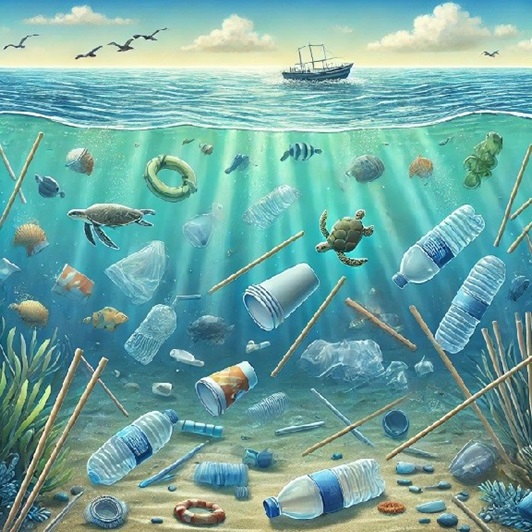Massachusetts-based Woods Hole Oceanographic Institute (WHOI) research scientists, in partnership with bioplastic manufacturing company Eastman, have reported developing a new a prototype bioplastic straw that degrades even faster than paper.
The Problem With Drinking Straws
The problem with plastic drinking straws is that they are now one of the most commonly found sources of marine litter. Their single-use nature contributes to global plastic pollution. These straws are not biodegradable, perhaps taking hundreds of years to break down. In oceans, for example, they can harm marine life both physically and through ingestion.
Lack of Understanding
Although the research looked at this issue, the study was carried out with a bioplastic company as a partner. Therefore, the researchers made the point that there is a lack of understanding of how long plastics (such as drinking straw plastics) last in the ocean and that, although science supports moving away from using the material, plastics are here to stay. The researchers therefore carried out the research with the overarching idea that it’s important to try and find a next-generation type of plastic that works equally as well, yet which degrades much more quickly, and doesn’t contribute to persistent plastic pollution in the environment.
Study
As acknowledged by the researchers, not all plastics are created the same and different manufacturers have different formulations of base polymers, e.g. polylactic acid (PLA) and polypropylene (PP) and chemical additives, meaning that different plastic formulations behave differently in the environment and break down in the ocean at different rates.
As part of the research, therefore, WHOI scientists Collin Ward, Bryan James, Chris Reddy, and Yanchen Sun put different types of plastics and paper drinking straws head-to-head to see which degrade the fastest in the coastal ocean.
This involved suspending eight different types of straws in a tank of continuously flowing seawater from Martha’s Vineyard Sound, Massachusetts. The tank’s temperature was controlled while light exposure plus other environmental variables were made to mimic the natural marine environment. The eight straws were monitored for signs of degradation over 16 weeks, and the microbial communities growing on the straws were characterised.
The Findings
The researchers (who published their paper in ACS Sustainable Chemistry & Engineering) found that some biodegradable straws degrade up to 50 per cent in just 16 weeks in marine environments, thereby offering a potential sustainable alternative to traditional plastics and potentially contributing to reduced ocean pollution. Specifically, the researchers found that a prototype straw made from a material called cellulose diacetate (CDA) – a polymer derived from wood pulp – breaks down even faster than paper in the environment when foamed (foamed CDA).
WHOI scientist, Brian James, said: “The unique aspects of this foam straw are that it’s able to have a shorter expected lifetime than the paper straws but retain the properties that you enjoy of a plastic or a bioplastic straw”. This could indicate that the foamed prototype straw could become a promising alternative to conventional plastic straws compared to paper straws, which degrade quickly in the ocean but sour user-experience by getting soggy.
The Value Of The Study
Jeff Carbeck, Eastman’s Vice President of Corporate Innovation, highlighted the value of the study, saying: “This study can be immensely valuable for straw manufacturers by providing informed and transparent data when selecting a material for straws. Even more, it provides reassurance that CDA-based straws won’t add to the persistent plastic pollution, while also demonstrating straw manufacturers’ commitment to offering a sustainable product that reduces risk to marine life”.
Going Forward
WHOI scientist Collin Ward said that he and the rest of the research team plan to continue measuring the degradability of plastic materials, with the hope of guiding where the industry goes next and that the object is to “optimise their products for degradation in the environment and ultimately the good of the planet.”
What Does This Mean For Your Organisation?
The development of a new bioplastic straw that degrades faster than paper by WHOI researchers (and Eastman) could present a significant opportunity for UK businesses and organisations committed to sustainability. This innovation not only addresses the persistent issue of plastic pollution in marine environments but also aligns with the increasing consumer demand for environmentally responsible products.
For businesses in the hospitality and food service industries, integrating biodegradable straws could enhance their sustainability credentials and appeal to a more eco-conscious clientele. It offers a practical solution that does not compromise on user-experience, overcoming the common drawback of paper straws that tend to become soggy. This shift could serve as a substantial point of differentiation in competitive markets, potentially attracting new customers and improving customer satisfaction among those who take a real interest in the environmental impact of their purchasing decisions.
Also, the introduction of these bioplastic straws could influence supply chains. For example, companies might consider transitioning to these more sustainable materials as part of their procurement processes, which could help in setting new standards within the industry. This move could also pre-empt future regulatory changes as government policies increasingly favour environmental sustainability in business practices.
This development could also inspire more innovation within the UK’s manufacturing sector. Companies involved in the production of single-use items, for example, may be inspired to explore and invest in similar biodegradable technologies. Such innovation not only aids in compliance with environmental regulations but also opens up avenues for new products and market expansion.
Overall, the research from WHOI and Eastman could be a catalyst for UK businesses to re-evaluate and potentially change their environmental strategies. By adopting these faster-degrading bioplastic straws, businesses could significantly reduce their ecological footprint, align with global sustainability trends, and position themselves as leaders in the movement towards a more sustainable future.




